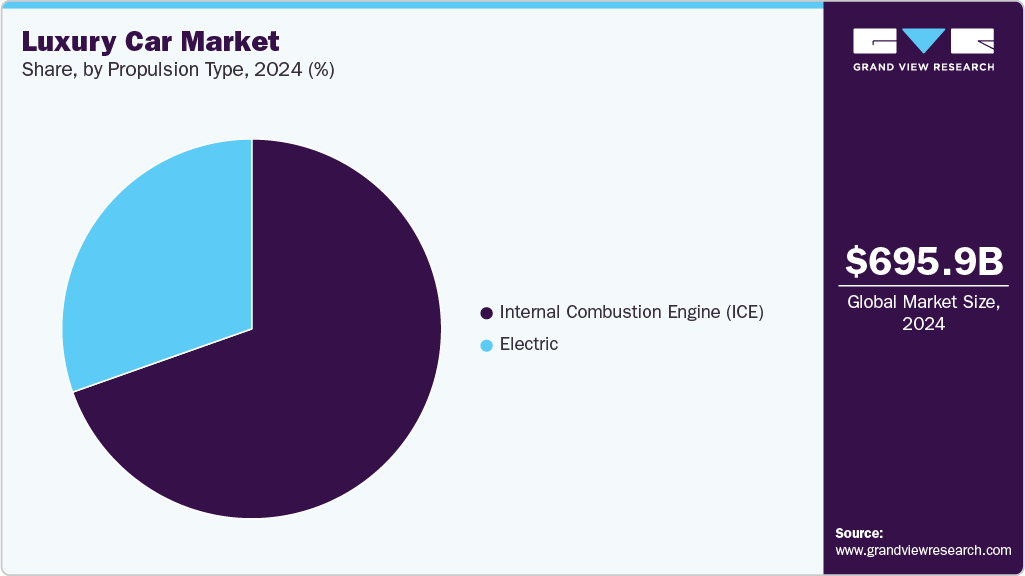Luxury Car Market 2030: How Consumer Preferences are Evolving?
The global luxury car market was valued at USD 695.92 billion in 2024 and is projected to reach USD 1,046.87 billion by 2030.
The global luxury car market was valued at USD 695.92 billion in 2024 and is projected to reach USD 1,046.87 billion by 2030, expanding at a CAGR of 7.2% from 2025 to 2030. A major driver of this growth is the electrification of luxury vehicles, as consumer preferences shift toward high-performance electric vehicles (EVs) that combine advanced technology with environmental responsibility.
Tesla's success, highlighted by the Model Y becoming the best-selling luxury CUV in 2021 and 2022, reflects a growing trend toward electric luxury cars. U.S.-manufactured luxury CUVs also saw an increase in their domestic sales share—from 37.9% in 2018 to 49.4% in 2022—showcasing both increased production and consumer confidence. As Tesla continues to set benchmarks, traditional luxury automakers are accelerating their electric vehicle strategies, particularly in regulated markets, further propelling the shift toward luxury EV adoption.

Luxury car manufacturers are also prioritizing the use of lightweight materials to meet global emission standards and improve fuel economy. Collaborations with suppliers like Toray Industries have allowed manufacturers such as BMW and Mercedes-Benz to reduce vehicle weight by at least 10%, resulting in better performance and efficiency. Vehicles like BMW’s i-series, built with carbon fiber-reinforced materials, extend battery life and enhance the appeal of luxury electric models, contributing to market growth.
The rise in U.S.-based luxury vehicle production, which climbed from 59.3% in 2018 to 77.6% in 2022, is fueled by consumer preference for locally assembled models, improved supply chain resilience, and favorable trade policies. Facilities such as BMW's Spartanburg plant—which exports 70% of its output—demonstrate the benefits of localization in reducing trade risk and capitalizing on incentives like the Advanced Technology Vehicles Manufacturing Loan Program, thereby reinforcing U.S. competitiveness in luxury SUV production.
Order a free sample PDF of the Luxury Car Market Intelligence Study, published by Grand View Research.
Key Market Trends & Insights
- Regional Insights: North America led the global luxury car market in 2024, accounting for a 23.0% revenue share. Consumer interest in exclusivity, technology, and high performance, along with a strong economy and high disposable incomes, continues to drive market demand. There's a growing preference for electric and hybrid luxury models, especially SUVs and crossovers, which offer a combination of comfort, versatility, and prestige.
- By Vehicle Type: The sports utility segment held the highest share at 58.0% in 2024. Luxury SUVs are becoming the vehicle of choice among affluent consumers due to their blend of prestige, power, and practicality. Models such as the Mercedes-Benz GLS, BMW X7, and Range Rover cater to evolving consumer lifestyles, offering features like AI-assisted driving, luxury interiors, and eco-friendly options. This segment’s growth is further supported by increased interest from female buyers and urban professionals.
- By Propulsion Type: Internal Combustion Engine (ICE) vehicles continued to dominate the market in 2024, maintaining the largest share. Although EV adoption is rising, ICE-powered luxury cars remain prevalent, particularly in regions lacking EV infrastructure. Manufacturers are improving ICE efficiency through turbocharged engines, mild-hybrid systems, and sustainable interiors, positioning ICE models as a transitional solution during the industry’s shift to electrification.
Market Size & Forecast
- 2024 Market Size: USD 695.92 Billion
- 2030 Projected Market Size: USD 1,046.87 Billion
- CAGR (2025-2030): 7.2%
- North America: Largest Market in 2024
Key Companies & Market Share Insights
Prominent players in the global luxury car market include BMW AG, Aston Martin, General Motors, and Mercedes-Benz Group AG. These companies leverage their strong brand equity, technological innovation, and customer-centric strategies to remain competitive. Their focus on integrating advanced safety systems, high-performance drivetrains, and autonomous features reflects ongoing investments in R&D to meet evolving consumer demands.
- Mercedes-Benz Group AG has expanded its product line through its electric EQ brand, reinforcing its commitment to sustainability. It also leads with innovations like Level 3 autonomous driving and the MBUX infotainment system, positioning itself as a global benchmark in luxury automotive excellence. Its wide manufacturing footprint and market presence in Europe, China, and the U.S. further cement its leadership.
- Volkswagen, through its luxury brands Audi, Porsche, Bentley, and Lamborghini, plays a crucial role in the premium automotive space. The company is aggressively expanding its electric vehicle offerings via the Premium Platform Electric (PPE) and is heavily invested in software-defined vehicles and autonomous technologies, strengthening its foothold in the next era of mobility.
Key Players
- BMW AG
- Aston Martin
- Volkswagen
- General Motors
- Mercedes-Benz Group AG
- Stellantis NV
- Tesla
- TOYOTA MOTOR CORPORATION
- Tata Motors Limited
- Volvo Car Corporation
Explore Horizon Databook – The world's most expansive market intelligence platform developed by Grand View Research.
Conclusion
The global luxury car market is undergoing a dynamic transformation, driven by electrification, lightweight innovation, and changing consumer preferences. The shift toward electric and hybrid vehicles, especially among high-income consumers, reflects growing environmental awareness and demand for cutting-edge technology. While ICE vehicles still dominate in certain markets, the transition to EVs is well underway, with manufacturers investing in sustainable materials, domestic production, and advanced features to meet global standards.
North America’s leadership in market share, the popularity of luxury SUVs, and increasing female and millennial participation in the segment signal a broadening consumer base. As top automakers like Mercedes-Benz and Volkswagen continue to innovate and expand globally, the luxury automotive market is expected to maintain steady growth through 2030, setting new benchmarks in performance, technology, and sustainability.